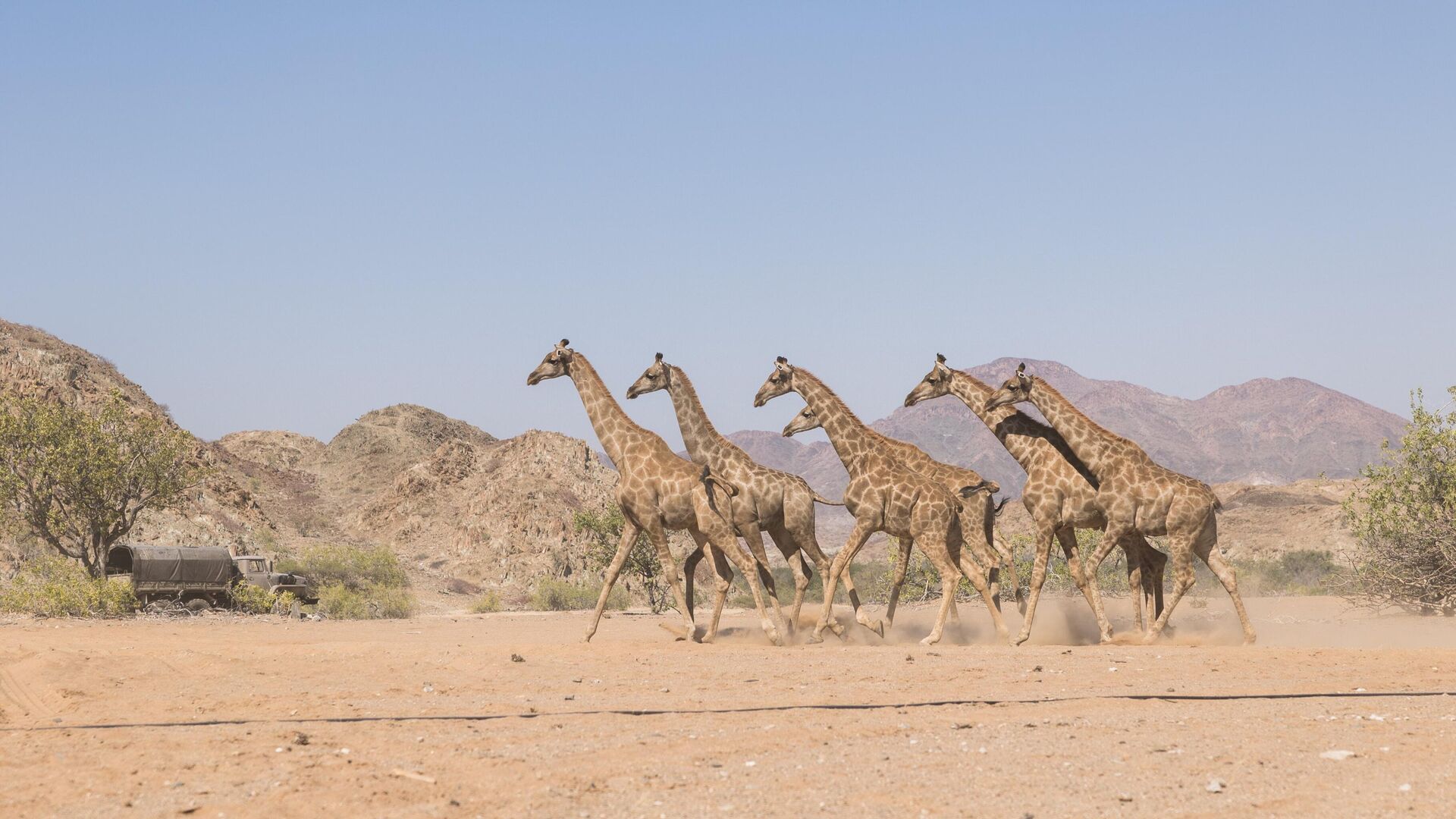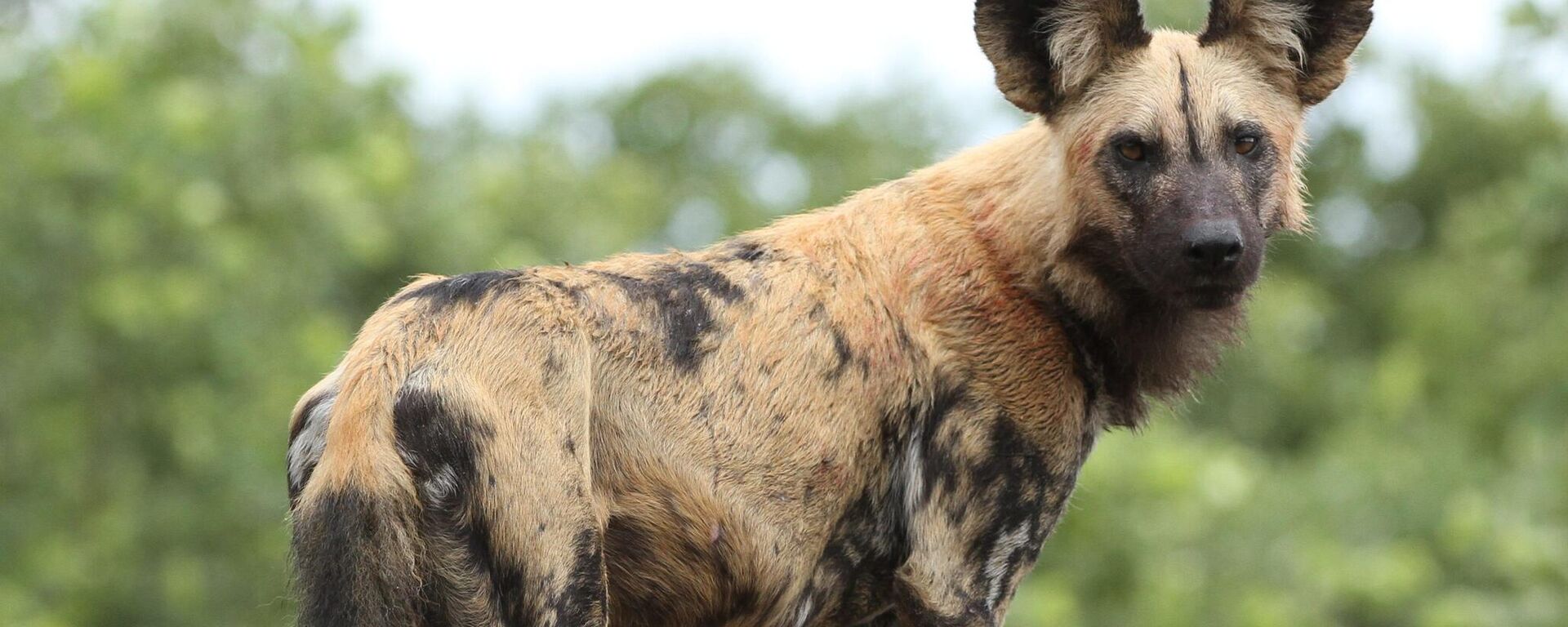https://en.sputniknews.africa/20230709/message-of-hope-14-angolan-giraffes-return-home-from-namibia-1060430517.html
'Message of Hope': 14 Angolan Giraffes Return 'Home' From Namibia
'Message of Hope': 14 Angolan Giraffes Return 'Home' From Namibia
Sputnik Africa
The Angolan giraffe, a subspecies of the southern giraffe, is mainly found in northern Namibia, southwestern Zambia, Botswana, with some in the Democratic... 09.07.2023, Sputnik Africa
2023-07-09T12:45+0200
2023-07-09T12:45+0200
2023-07-09T12:50+0200
sub-saharan africa
southern africa
animals
animals' protection
nature
nature reserve
angola
namibia
https://cdn1.img.sputniknews.africa/img/07e7/07/09/1060432265_0:0:3640:2048_1920x0_80_0_0_9638732fdaa83032815646b4a321b7ff.jpg
The first native giraffes to be returned to Iona National Park, in southwestern Angola, arrived from Namibia this week as part of efforts to restore the country's wildlife and species diversity, which was impacted by years of conflict. After travelling over 1,300 km in a long 36-hour journey from a private game farm in central Namibia, 14 giraffes, seven males and seven females, returned to the Angolan national park, where the species was historically present. The move is considered to be the first of multiple translocations to return the giraffes to their historical range and ensure a viable population in the park. Since the 1990s, the species was thought to be extinct in Angola.The translocation was carried out by African Parks, an NGO that oversees the management of national parks in 12 countries, in partnership with the Angolan government and Giraffe Conservation Foundation (GCF), which, along with the Wyss Foundation, sponsored the project. The giraffes, each measuring up to 3.5 meters in height, were captured in Namibia on July 3 and arrived in Iona in a specially designed truck on July 5. According to Stephanie Fennessy, executive director and co-founder of GCF, the giraffe translocation is a difficult process, during which "much can go wrong, from the capture to loading, during transport and release." She noted that the feasibility study for this initiative began over two years ago.The 14 giraffes are expected to be the first of multiple translocations because there are plans to set up a new viable population of Angolan giraffe nationwide. The translocated animals are all young, she stated, adding that the foundation along with other partners will monitor them long-term and see how they adapt to their new habitat before introducing more.The reintroduction of the Angolan giraffe to Iona National Park plays a critical role in restoring the park’s ecosystem and re-establishing its ecological processes. Fennessy explained that the giraffes will fill "an ecological niche as landscape-changers and pollinators." According to Abias Huongo, Secretary of State for the Ministry of Environment of Angola, the first giraffe translocation is an important milestone in the country's "conservation journey" that demonstrates its commitment to preserving and enriching its natural heritage.
https://en.sputniknews.africa/20230629/not-seen-in-a-dogs-age-nearly-extinct-african-painted-dog-spotted-in-uganda-1060228805.html
southern africa
angola
namibia
Sputnik Africa
feedback@sputniknews.com
+74956456601
MIA „Rossiya Segodnya“
2023
News
en_EN
Sputnik Africa
feedback@sputniknews.com
+74956456601
MIA „Rossiya Segodnya“
Sputnik Africa
feedback@sputniknews.com
+74956456601
MIA „Rossiya Segodnya“
southern africa, animals, animals' protection, nature, nature reserve, angola, namibia
southern africa, animals, animals' protection, nature, nature reserve, angola, namibia
'Message of Hope': 14 Angolan Giraffes Return 'Home' From Namibia
12:45 09.07.2023 (Updated: 12:50 09.07.2023) The Angolan giraffe, a subspecies of the southern giraffe, is mainly found in northern Namibia, southwestern Zambia, Botswana, with some in the Democratic Republic of the Congo and South Africa. They are believed to have vanished from Angola's Iona National Park in the 1940s, and by the 1990s, there were no Angolan giraffes left in the country.
The first native giraffes to be returned to Iona National Park, in southwestern Angola, arrived from Namibia this week as part of efforts to restore the country's wildlife and species diversity, which was impacted by years of conflict.
After travelling over 1,300 km in a long 36-hour journey from a private game farm
in central Namibia, 14 giraffes, seven males and seven females, returned to the Angolan national park, where the species was historically present.
The move is considered to be the first of multiple translocations to return the giraffes to their historical range and ensure a viable population in the park. Since the 1990s, the species was thought to be extinct in Angola.
"It’s great seeing a species back where it should be," Pedro Monterroso, Iona National Park manager told media: "It’s a message of hope for conservation in this country."
The translocation was carried out by African Parks, an NGO that oversees the management of national parks in 12 countries, in partnership with the Angolan government and Giraffe Conservation Foundation (GCF), which, along with the Wyss Foundation, sponsored the project.
The giraffes, each measuring up to 3.5 meters in height, were captured in Namibia on July 3 and arrived in Iona in a specially designed truck on July 5. According to Stephanie Fennessy, executive director and co-founder of GCF, the giraffe translocation is a difficult
process, during which "much can go wrong, from the capture to loading, during transport and release." She noted that the feasibility study for this initiative began over two years ago.
The 14 giraffes are expected to be the first of multiple translocations because there are plans to set up a new viable population of Angolan giraffe nationwide. The translocated animals are all young, she stated, adding that the foundation along with other partners will monitor them long-term and see how they adapt to their new habitat before introducing more.
"This collaborative effort of bringing giraffe back to Iona National Park is an extraordinary achievement for giraffe conservation in Angola. By reintroducing giraffe to their historical range, we re-establish their range, ensure their long-term survival and contribute to restoring the ecological balance in the region," Fennessy said.
The reintroduction of the Angolan giraffe to Iona National Park plays a critical role in restoring the park’s ecosystem and re-establishing its ecological processes. Fennessy explained that the giraffes will fill "an ecological niche as landscape-changers and pollinators."
According to Abias Huongo, Secretary of State for the Ministry of Environment of Angola, the first giraffe translocation is an important milestone in the country's "
conservation journey" that demonstrates its commitment to preserving and enriching its natural heritage.


